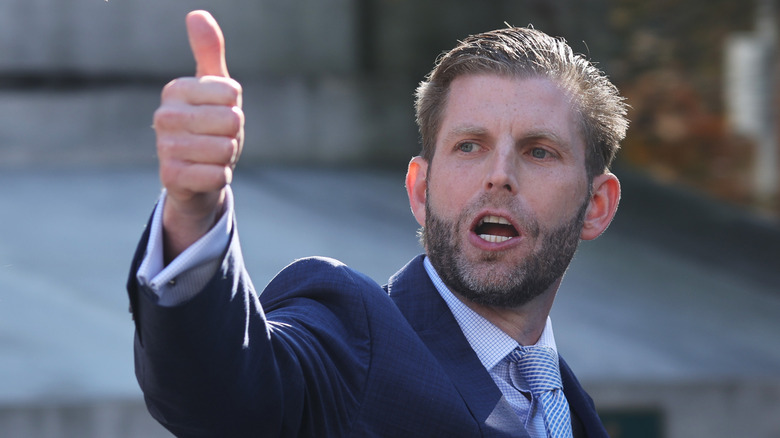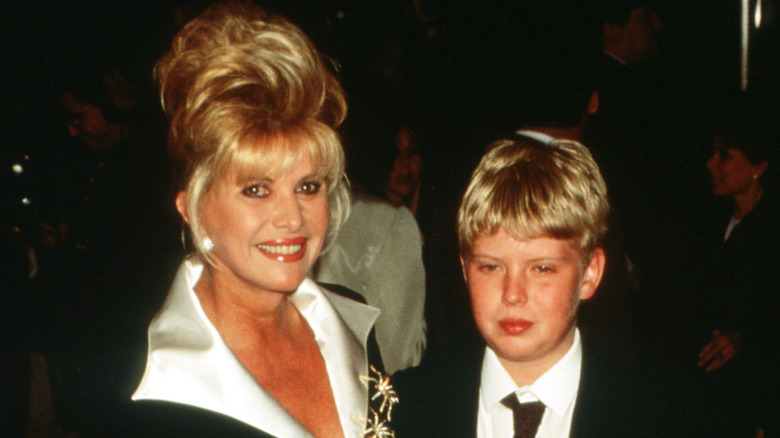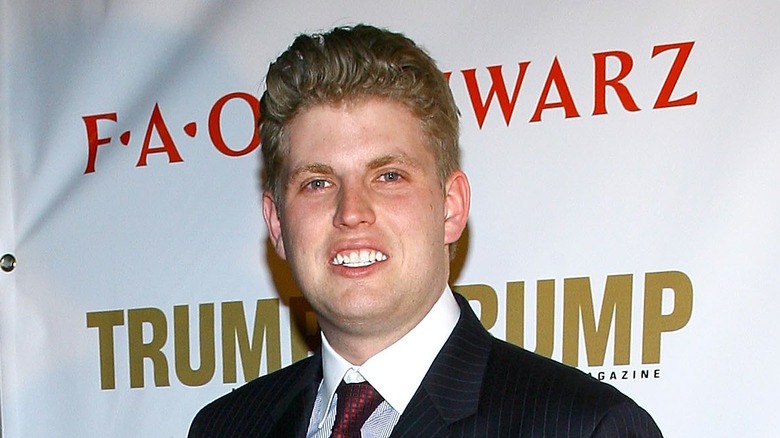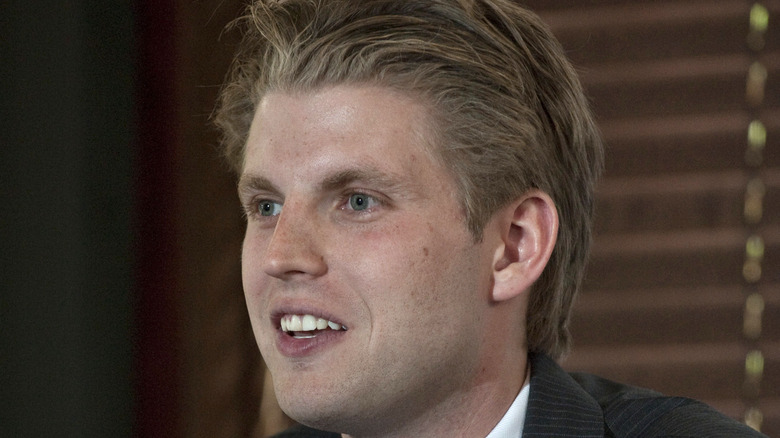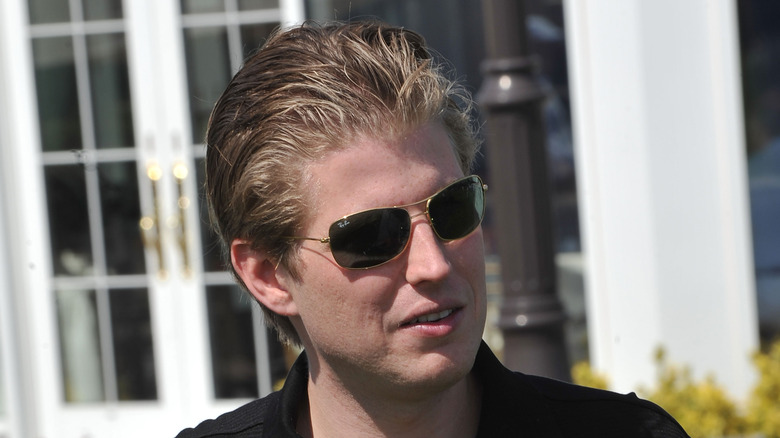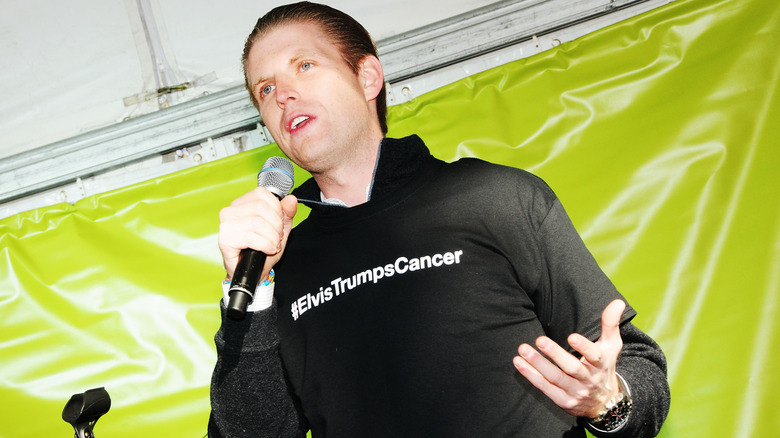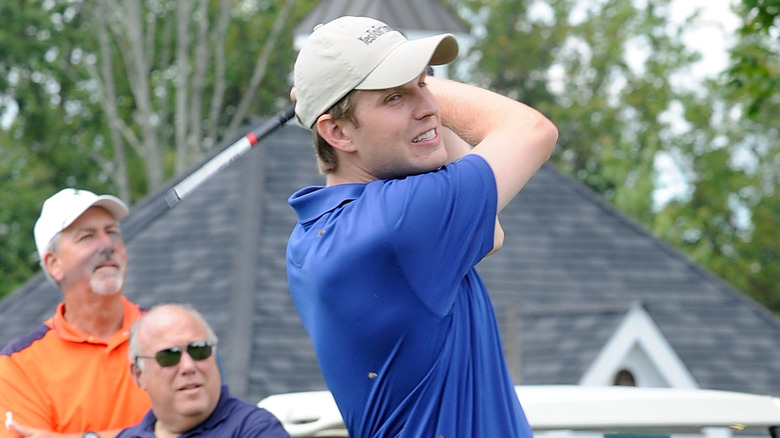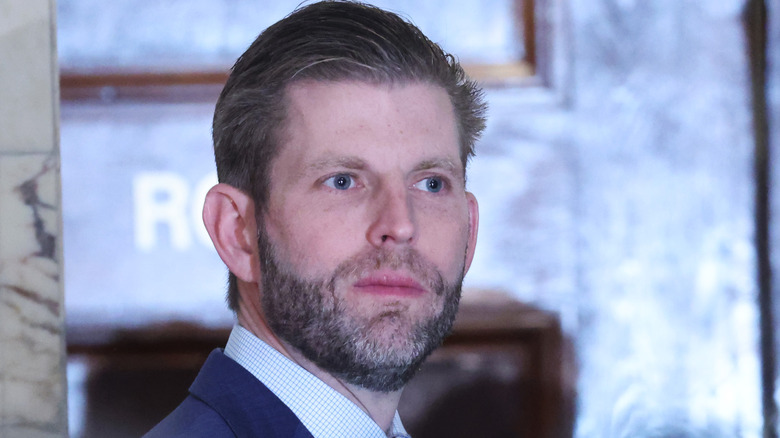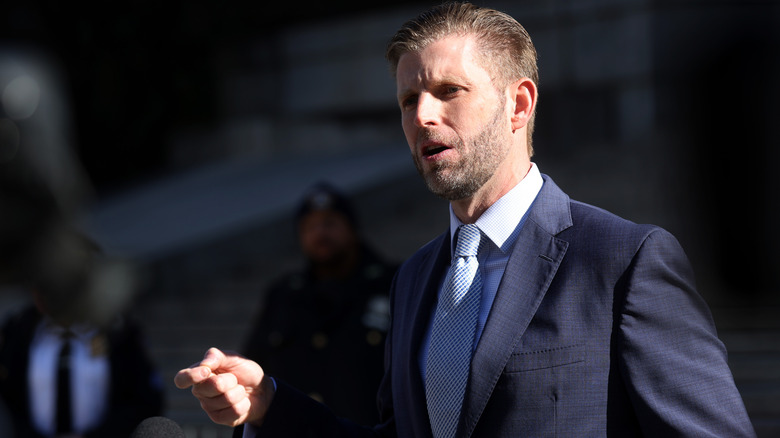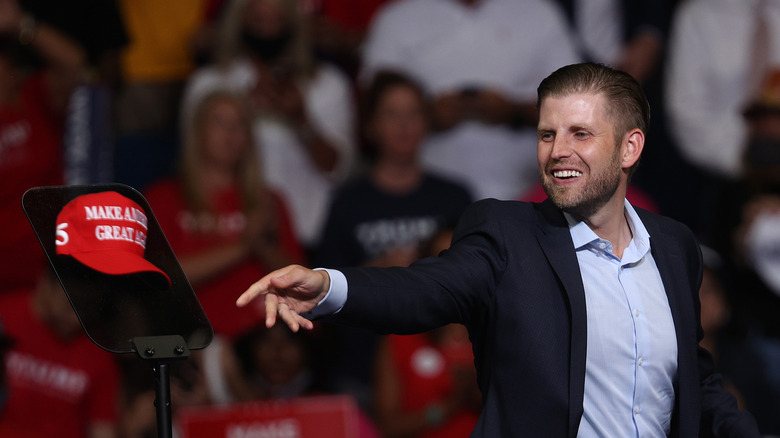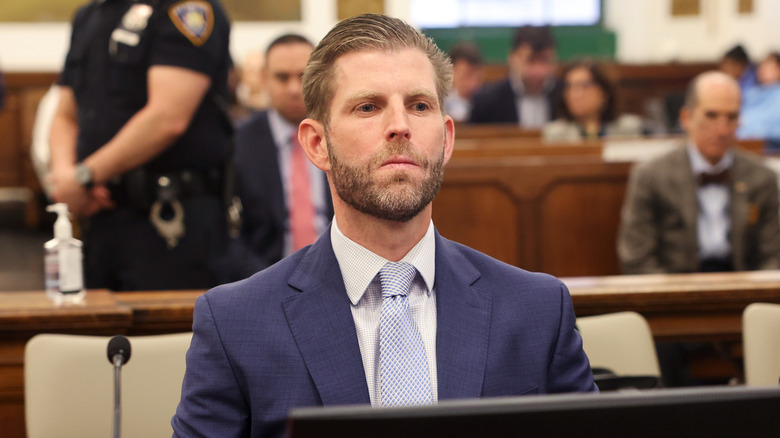Eric Trump's Transformation Is Turning Heads
Of the three children born to Donald and Ivana Trump, Don Jr. is every bit as brash and reckless as his dad, while Ivanka retains the demure savviness of her mother, Ivana Trump. As for Eric Trump, being the youngest of the famous trio comes with its own disadvantages, not the least of which is constantly being lampooned. Not necessarily by his elder siblings, but primarily by a merciless media that finds Eric to be the lowest-hanging fruit of the frequently-targeted Trump family tree. "Saturday Night Live" often ridiculed Eric as a vacuous toddler, "TrumpNation" author Tim O'Brien declared him "unusually ignorant and unusually unsophisticated" on MSNBC, and streaming late-night talk show host Jimmy Kimmel called him "Tweedle-even-dumber."
That said, little has been written about Eric's achievements, like graduating with honors in finance and management from Georgetown University, adding a plethora of golf resorts under the Trump umbrella, and turning around the family's failing vineyard operations. Those are impressive credentials for anyone occupying such lofty posts, although Eric and brother Don Jr.'s handling of the Trump Organization doesn't stand up to public scrutiny, especially after losing a major civil fraud trial which will see them, as well as their father, fork over $355 million in damages. But in the end, he's still a Trump, and he's still considered fair game.
His parents' divorce helped Eric Trump grow a thick skin
Life in Trump Tower was ground zero for Eric Trump's extravagant upbringing, offering all the comforts that a New York real estate tycoon like Donald Trump could afford. But luxury couldn't replace the unhappiness 6-year-old Eric felt when pops decided to abandon his wife Ivana for model Marla Maples in 1990. The divorce was painful enough, but the increase in tabloid attention didn't help, either. If anything, Eric believed the circumstances toughened him up, although he admitted he gave little thought to connecting the family breakup with the media scrutiny he faced. "I maybe never really put two and two together," he said to Fox Business, "but that's probably when we first started getting a little bit of the limelight, some of the attention, and I had to learn to not care."
While his mother took over much of the childrearing responsibilities concerning the three Trump children, Eric said his father was also influential. Donald wasn't exactly the type to play with the kids, preferring to take them to construction sites of his property developments. "But he was also strict," said Eric. "You had to do well in school. Every day I left, I was six years old, he would say 'no drinking, no drugs, no smoking.' That's who he was. He was always so disciplined, but at the same time he gave us enough latitude when we were young professionals to spread our wings a little bit and learn."
He claimed he worked construction at the age of 11
Eric Trump followed his father's strict advice and stayed on a straight and narrow path throughout his education years from a private school in New York to a Pennsylvania boarding school and eventually to Georgetown University. But his father's guidance extended well beyond the classroom, making sure the kids learned the value of a buck by doing a great deal of odd jobs on several Trump properties. "We were literally riding mowers around, we were mowing all the fields, cutting down trees and fallen trees, cutting rebar and laying marble and doing electrical work, doing demo work," said Eric to Forbes.
But learning what it was like to punch a clock like regular folks wasn't limited to manual labor. Eric claimed his father made him work on more professional tasks, some of them downright dangerous, given that the Trump lads weren't even adults. "He made us work very, very hard. I was on construction sites when I was 11, 12 years old — you know, doing [demolition], breaking down walls, concrete, sheet rock, plumbing — stuff I still do for myself these days," said Eric on Kari Lake's talk show on X. Those remarks astounded respondents on social media, who quickly challenged those claims. "So did he just admit his father broke child labor laws?" asked one wag, followed by another who wrote, "Did he [stiff] him when it came time to be paid like he does many of his contractors?" per OK Magazine.
Eric Trump finally figured out his destiny
Unlike older sister Ivanka, who initially gravitated towards modeling while growing up, and older brother Don Jr., who at one time abandoned the family business for a partying lifestyle in Colorado, Eric Trump made a beeline towards a career with his father's real estate empire once he finished school. "My dream is definitely to be sitting in the office in Trump Tower learning from my father," said Eric to CBS News in 2003, when he was only 19. "I think we're gonna be an unbeatable team." But even as a child, Eric mused that he would either be a firefighter or a fighter pilot, although architecture was never far from his mind. "I've always loved buildings and the tangible nature of it," said Eric to AOL back in 2011. He toyed around with the idea of engineering while at Georgetown University, before picking business as a major and psychology as a minor.
By 2006, Eric had joined the Trump Organization as the company's executive vice president of development and acquisitions, a year before the global financial meltdown hit. Undaunted by the recession flattening real estate values, Eric called the period "the greatest opportunity in the world for us as a company but more specifically me," per City & State New York, as the company went on a lengthy spree buying up as much land as possible. The family business had survived, despite three of their Atlantic City casinos going bankrupt during that period.
He became a rising executive star
While Eric Trump may have grabbed a bit of the spotlight when he joined the Trump Organization, he was still operating in the shadows of his father and elder siblings. But slowly, he was coming into his own, first by taking the reins of a redevelopment project involving a world-class, Florida-based golf course that the real estate giant had bought. But where Eric showed he could operate an entire company independently was in the wine business, once his father made him president of Virginia-based Trump Winery in 2013, a business he purchased two years earlier in a bankruptcy auction. Investing heavily into improving the orchards, installing new equipment, and creating a building specializing in producing sparkling wine, Eric turned the operation around, making it the biggest winery in Virginia.
The winery's general manager credited Eric for its success, calling the executive, "one of the best bosses I've ever had," per Decanter. In 2014, Wine Enthusiast magazine named Eric the industry's "Rising Star of the Year" for the Virginia establishment's turnaround. "If you would have told me that we would have owned the largest winery on the east coast, I literally would have laughed," said Eric upon receiving the award at a Wine Enthusiast ceremony. "But the more I got involved in the wine business, it really became a labor of love and I have to say of all the projects I work on all over the world, it is by far the most rewarding."
Eric Trump's charity was under government scrutiny
With a major public profile thanks to a cushy vice president spot at his father's empire, Eric Trump created a foundation under his own name in 2006 to subsidize St. Jude's Hospital in Tennessee on such projects as a $198 million surgery and ICU complex. Besides that stroke of benevolence, the foundation provided Eric a chance to whack some balls on the fairway, as golf tournaments (on Trump courses) generated much of the funds for the hospital. But Eric's squeaky-clean reputation was in danger of a heavy tarnish after reports started surfacing that the Trump family was skimming from the foundation coffers. One report revealed that Eric scooped up to $1.2 million, originally destined for St. Jude projects, instead using it for operations at the Trump Organization. An additional $500,000 in donations were allegedly directed towards Trump-favored charities who paid the company to use Trump golf courses for their own fundraising tournaments.
By the time New York's Attorney General started looking into the matter in 2017, Eric had already disassociated himself from the foundation. His departure apparently wasn't scandal related, but was intended to sidestep any potential conflicts of interest, shortly after his father was elected president. "While I resigned with a heavy heart, it was a voluntary decision to enact these measures during the tenure of my father's presidency in order to avoid the appearance or assertion of any impropriety and/or a conflict of interest," he wrote on the foundation website.
He boasted about business funds coming from Russia
Unlike some members of his family, Eric Trump has preferred to fly under the radar. "Eric has Trump genes, but he doesn't have the Trump brand," said Georgetown University classmate Clare Fieseler to The Washington Post. "I've always admired that he is uniquely his own in that way. Less bombastic, more thoughtful. Less self-aggrandizing, more humble. Less Trump. More Eric." But Eric's has been known to occasionally loosen his humility leash, including one time in 2013, when teeing off with golf writer James Dodson, he boasted about an investment source after the financial market collapse. "Well, we don't rely on American banks. We have all the funding we need out of Russia," said Dodson, recalling Eric's remark, to WBUR in 2017.
Catching wind of Dodson's riveting comments, media outlets like Vanity Fair suggested a link between that Trump financial pipeline and alleged dealings with the Russians to influence the 2016 federal election. Eric denied the allegations, telling the New York Post, "We have zero ties to Russian investors." Eric was mentioned twice in the 2019 release of the Report on the Investigation into Russian Interference in the 2016 Presidential Election, both involving meetings of little or no consequence. The report concluded that "the investigation did not establish that the Trump Campaign coordinated with the Russian government in its election interference activities."But despite the investigation not establishing particular facts about interference, the report wasn't about to deny that those facts didn't exist.
Eric fought back against his idiot reputation
Despite helming a winery to prosperity and boosting the Trump Organization's golf course count, Eric Trump couldn't escape a buffoonery label pasted on him. And once he and brother Don Jr. took over the family business after their father became president, the jabs multiplied. It didn't help that Eric suffered his own case of foot-in-mouth disease, such as the time he backed his father's support of waterboarding torture, claiming the activity was no different than a fraternity initiation (per Time). Or when he told Fox News in 2020, "After November 3 [the day after the federal election], coronavirus will magically, all of a sudden, go away and disappear and everybody will be able to reopen."
"Unfortunately it is the price one pays for being in a political family," said Eric to The Washington Post in 2018 about the SNL pokes. "They got it wrong, they detest us and they will do anything to try and undermine our credibility." To be fair, his response was far from the garrulous insults that his father and brother might have employed. But Eric has enjoyed some redemption, only because Don Jr. had been in media crosshairs more frequently. "I'd like to apologize to Eric Trump," said talk show host Stephen Colbert in 2017. "We always thought you were the dumb one. We were wrong."
His attack on supposed Biden nepotism backfired
Eric Trump's unflattering public persona aside, the scuttlebutt within the family is that he's far more serious about the business than his elder brother Don Jr. "I'm probably a little more relaxed about certain things," Don Jr. remarked to The Washington Post. "There are times he gets a little more formal, where I'm sort of almost always informal." But Eric has been prone to committing gaffes, such as the time he attacked President Joe Biden's son Hunter for using his father's credentials to take advantage of business opportunities in Ukraine. "He didn't speak the language!" Eric exclaimed regarding Hunter Biden's dealings in Ukraine to Fox News. "He didn't know anything about the industry he was in, he didn't have any discernible duties, and he's getting paid $50,000 a month?"
But media analysts quickly pointed out that Donald Trump's three oldest children have benefited from his tenure in the White House. When the brothers took over the Trump Organization once Trump became president, the company promised not to do any new deals, especially internationally. However, the sibling CEOs broke that pledge when they sold up to $100 million in property and $3.2 million in Dominican Republic land. Interestingly, they scuttled a domestic hotel deal out of fear of a conflict of interest. "We live in a climate where everything will be used against us, whether by the fake news or by Democrats who are only interested in presidential harassment," Eric said, per The New York Times.
Eric Trump has pushed several political conspiracies
Given that Eric Trump graduated with honors from Georgetown, ranked in the top 25 among roughly 400 national universities offering business education, it stands to reason that he has some smarts going for him. What's mystifying is that he willingly spreads easily debunkable political conspiracies, despite a well-rounded education (although in fairness, there's no evidence he actually believes them). It didn't stop him from posting a meme including a logo of QAnon, a major contributor to the conspiracy dump, on his X account. Before the election, Eric commented on a talk radio segment that New Yorkers were receiving mailed ballots already filled out with Biden's name selected, a claim without any backing evidence.
The day after the federal election, Eric posted on social media ballots favoring Trump being burned, only to have fact checkers reports that those ballots were samples destroyed before the election. A couple of weeks later, he pressed the point that the cards were deliberately stacked against his father from the moment he kick-started his campaign. "Biden couldn't get 10 people to a rally & went days without leaving his house," lamented Eric in a November 16 post on X, adding that Trump tallied 11 million more votes than in 2016, including twice the support from African-Americans. "This election was rigged from the beginning." And despite no evidence, Eric apparently supported one claim that leftist activists Antifa staged the January 6 riots in a since-deleted X entry, per NBC News.
His fraud trial testimony didn't impress skeptics
Over the years, Eric has challenged some of those negative stereotypes against him, although one court appearance in November 2023 did nothing to enhance his image. It wasn't just his profile at stake, but the well-being of the whole Trump empire, which was sued by New York's Attorney General on the grounds that the company falsely altered asset values to attract investors and avoid taxes. His tenure on the witness stand was disastrous, especially when claiming he was unaware that some documents he passed along in an email to a co-defendant were statements of financial condition, material of particular interest to the Attorney General. He added his involvement in appraisals of one contentious project was limited. "That's not the focus of my day," he said, per CNN. "I focus on construction. I don't focus on appraisals."
Judge Arthur Engoron didn't buy it, or any other Trump testimonies, ordering them to pay $455 million in damages when the trial concluded in February 2024. The Trump Organization was still able to operate, but in a more limited capacity and only under court supervision. Eric lividly declared on Fox News that the fix was in since day one. "This judge ruled against my father even before we went to trial," he said. "He ruled against our entire family. It was a setup from the very beginning." It was a grandstanding display of the executive moxie he cultivated over time, but the law had other ideas.

